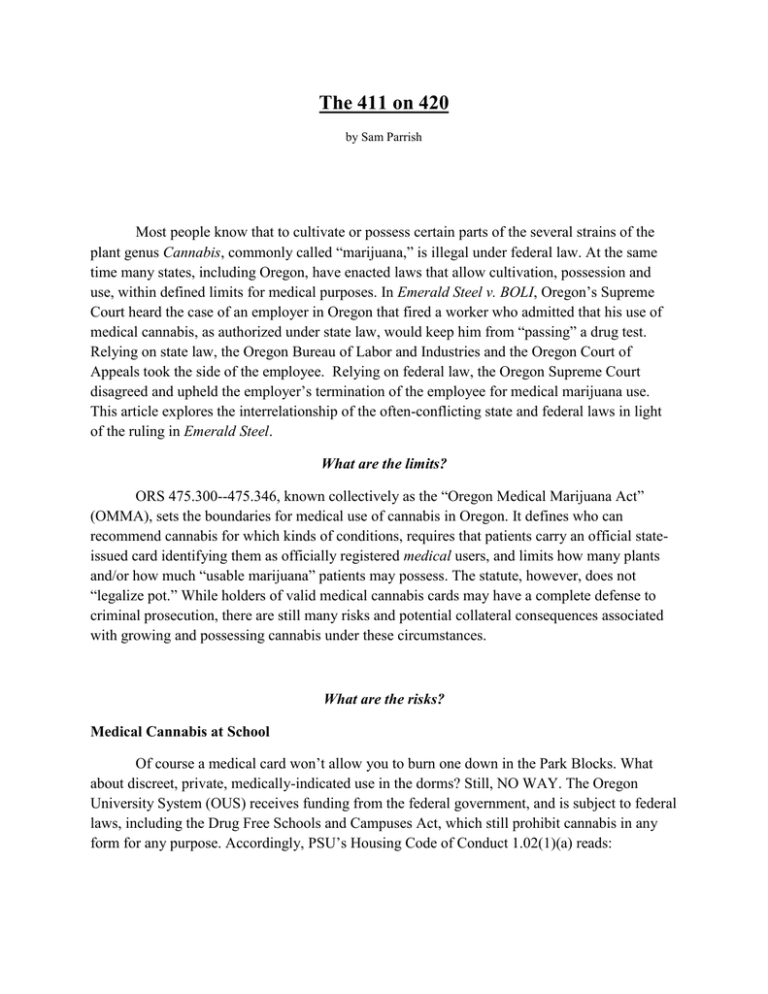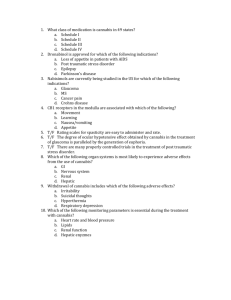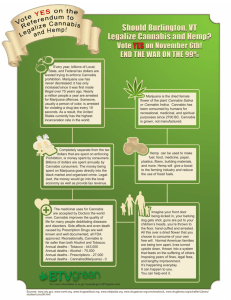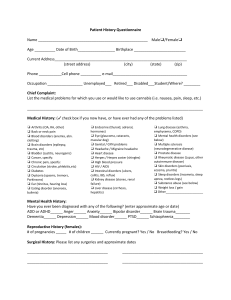The 411 on 420 - Portland State University
advertisement

The 411 on 420 by Sam Parrish Most people know that to cultivate or possess certain parts of the several strains of the plant genus Cannabis, commonly called “marijuana,” is illegal under federal law. At the same time many states, including Oregon, have enacted laws that allow cultivation, possession and use, within defined limits for medical purposes. In Emerald Steel v. BOLI, Oregon’s Supreme Court heard the case of an employer in Oregon that fired a worker who admitted that his use of medical cannabis, as authorized under state law, would keep him from “passing” a drug test. Relying on state law, the Oregon Bureau of Labor and Industries and the Oregon Court of Appeals took the side of the employee. Relying on federal law, the Oregon Supreme Court disagreed and upheld the employer’s termination of the employee for medical marijuana use. This article explores the interrelationship of the often-conflicting state and federal laws in light of the ruling in Emerald Steel. What are the limits? ORS 475.300--475.346, known collectively as the “Oregon Medical Marijuana Act” (OMMA), sets the boundaries for medical use of cannabis in Oregon. It defines who can recommend cannabis for which kinds of conditions, requires that patients carry an official stateissued card identifying them as officially registered medical users, and limits how many plants and/or how much “usable marijuana” patients may possess. The statute, however, does not “legalize pot.” While holders of valid medical cannabis cards may have a complete defense to criminal prosecution, there are still many risks and potential collateral consequences associated with growing and possessing cannabis under these circumstances. What are the risks? Medical Cannabis at School Of course a medical card won’t allow you to burn one down in the Park Blocks. What about discreet, private, medically-indicated use in the dorms? Still, NO WAY. The Oregon University System (OUS) receives funding from the federal government, and is subject to federal laws, including the Drug Free Schools and Campuses Act, which still prohibit cannabis in any form for any purpose. Accordingly, PSU’s Housing Code of Conduct 1.02(1)(a) reads: PSU Housing is unable to accommodate Medical Marijuana usage in our facilities regardless of the possession of appropriate medical marijuana authorization. So being caught with medical cannabis in student housing will still expose you to the same penalties, spelled out in the Student Code of Conduct, faced by recreational users who don’t comply with OMMA. Medical Cannabis at Work Does a “debilitating medical condition,” as defined in ORS 475.302(3), qualify as a “disability” under state or federal anti-discrimination laws, requiring employers to accommodate workers’ need for medical treatment? Even if it did, that may not matter. In Emerald Steel v. BOLI, the Oregon Supreme Court ruled that because cannabis remains illegal under federal law, Oregon’s employment discrimination laws do not require employers to accommodate employees’ use of cannabis to treat even a protected disability. This means that your employer can fire you for using or possessing cannabis on or off the job, regardless of your status under OMMA. Parenting & Custody Rights In addition to employment, there are other areas in which cannabis use can work against you, and OMMA may not help. For parents under DHS scrutiny for any reason, cannabis use can be seen as a negative, and OMMA cards do not mitigate that effect. DHS might find that parents’ use impairs their ability to care for their child(ren), even when authorized under OMMA. It’s hard to predict how medically-indicated cannabis use may affect an OMMA card holder’s custody of children in divorce cases, but it is very clear that drug use (even legally permissible drug use) is a factor in family and juvenile courts. How does the defense work? In order to use your qualifying status under OMMA to avoid prosecution or conviction for a crime involving cannabis, you must admit that you did use or possess the cannabis in question, while asserting an affirmative defense that OMMA allows you to do so. In an Oregon trial, this means that if you convince the jury that you have properly complied with OMMA, you are home free and cannot be convicted. If, however, the jury doesn’t believe that you qualify under OMMA, or that OMMA covers your use or possession that gave rise to the charge(s), you have given them all the necessary facts to convict you. This “affirmative defense of medical necessity” only works in states with medical cannabis laws, and only to the extent specified in the laws themselves. As of 2004, four states – Maine, Montana, Michigan, and Rhode Island—recognize valid medical cards from other states, and offer the protection of their own medical cannabis laws to out-of-state cardholders who comply with their limits on amounts and/or qualifying conditions. The other ten states with medical cannabis laws—Alaska, California, Colorado, Hawaii, Nevada, New Jersey, New Mexico, Oregon, Vermont, Washington—do not recognize medical cannabis authorization from any other state. For example, an Oregon medical cardholder cannot make an affirmative defense of medical necessity against cannabis charges in California or Washington. There is no affirmative defense to federal cannabis charges, and your OMMA status is inadmissible in federal court; that is, a federal jury is not allowed to consider or even know about your OMMA status. What can happen if you are convicted? The consequences of a criminal conviction depend on the amount of cannabis in question. In Oregon, possession of less than one ounce is a violation, similar to a traffic ticket. To possess a full ounce or more is a Class B felony, the second most serious level of criminal offense possible under Oregon law, which carries substantially more severe penalties, including prison time and/or huge fines. Even though the penalties for a violation are relatively mild, you can expect a variety of consequences in other aspects of your life. Just as one traffic ticket can affect your insurance premium or your ability to qualify for jobs that require driving, a cannabis violation will impact your eligibility for most financial aid loans, grants, and scholarships. What can I do? When confronted with criminal charges involving cannabis, or any legal issue at all that doesn’t involve PSU (including Campus Public Safety Office), contact Student Legal Services at 503-725-4556 or slms@pdx.edu. We may be able to handle your case if you have been charged with a violation or a misdemeanor. We do not handle felony matters. If we can’t help, we may be able to refer you to someone who can.





